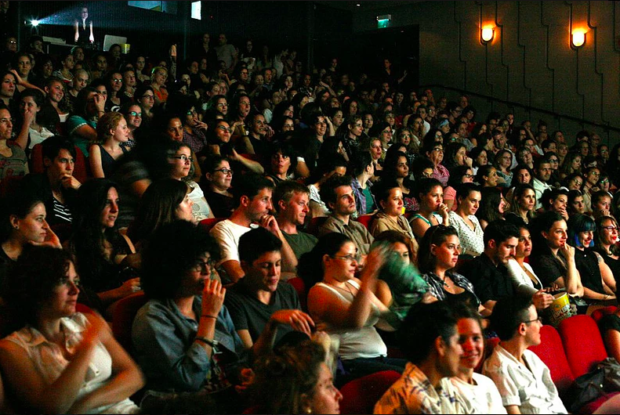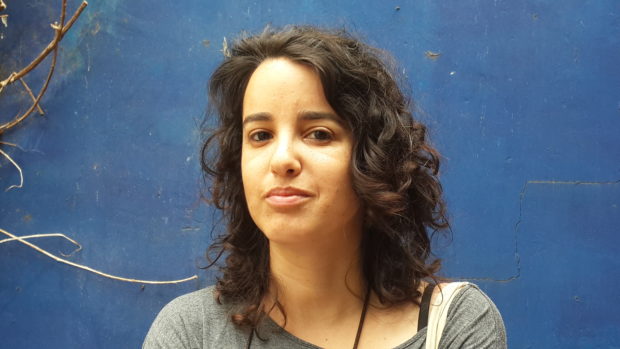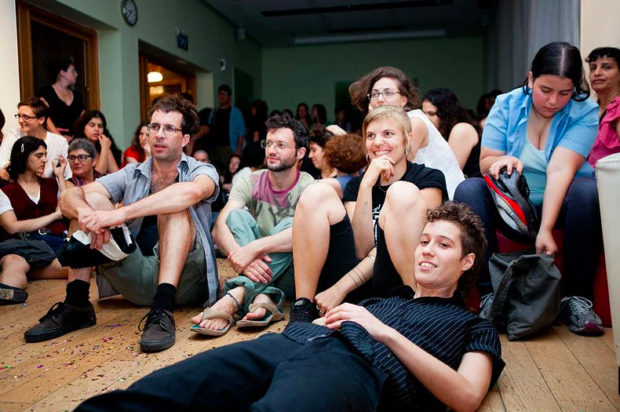You have no items in your cart. Want to get some nice things?
Go shopping
An interview with Lior Elefant, head of the Israeli Women in Film and Television Forum, and Program Director of the Israeli film festival, Lethal Lesbian.
Last month, a film festival celebrating the pioneering and often politically probing films that make up New Israeli Cinema was screened at the Curzon cinema in Soho. Five of the eight films are directed by women, including the likes of Palestinian director Maha Haj, whose film Personal Affairs was nominated in the Un Certain Regard category at Cannes in 2016; feminist filmmaker Michal Aviad, whose most recent film Working Woman had its world premiere at TIFF and will have its UK premiere at the Jewish Film Festival; and the world’s first ultra-orthodox female director, Rama Burshtein, whose films give an authentic look into orthodox communities in Israel. But is this programming choice representative of the bigger picture in the Israeli film industry? Over 30% of films in Israel are directed by women, compared to only 5% in Hollywood, a statistic that invites celebration, but feminist director Michal Aviad is more cautious: “In general, I disagree that Israel allows women to be more visible … our struggles are as difficult as in the US or the UK.”
I raised this debate with Lior Elefant, head of the Israeli Women in Film and Television Forum, and program director of Lethal Lesbian, the annual film festival in Tel Aviv. Elefant agreed with Aviad, but also turned my attention to the progress made, to the increase in numbers of female directors in Israel in the past ten years. “From only one film a year, we were close to a third of the films in 2015. There is a rise but the situation is still not good.” In a fitting promo sequence for Lethal Lesbian directed by Hadas Ayalon and posted on the film festival’s Facebook page last year, a young Israeli girl gives her family two updates at the dinner table. For the first announcement, she nervously reveals to her family that she is a lesbian. Her family erupt in laughter: “What do you think, that we live in the Stone Ages?” They could not care less about her sexual orientation, which pleases the young girl. She then announces she has enrolled at university to study film, and she is met with horror as her mother screeches in disbelief at the idea. Whilst the scene is played for comedy, I asked Elefant whether this conservative response to studying film was common in Israel, despite having some of the most prestigious film schools. “First of all, this was my personal story and from the comments we received on the video, I can tell you that I was not alone. Because film, in general, is not regarded as a profession.” Elefant explained that this wasn’t particularly gender specific: “In film school, the gender gap is not so big. We are almost at fifty-fifty male to female in classes. But when students finish, it’s a different story. To continue; to make films, to be a producer or a cinematographer, the pyramid gets smaller when we climb.”

Elefant, 37, worked as an editor for ten years and now considers herself a film activist. As the head of the Israeli Women in Film and Television forum, Elefant’s role is to focus on promoting, encouraging and supporting women in the film business. “Most of our activity is raising consciousness. We make the discourse more visible. Before we started the forum, almost nobody talked about this issue in Israel, but for the last six or seven years, people are actually starting to talk about the gender inequality, and it’s because of the forum. I think it’s actually really similar to Second Wave Feminism which was about raising consciousness through small support groups. I think that we really made a change. I agree with Michal Aviad that we cannot celebrate the rise in the percentage of female filmmakers, but I think it is a success nonetheless, that the subject of female directors is getting public attention.”
We turned to the success of Palestinian director Maha Haj’s subtle masterpiece, Personal Affairs (2016) which was screened at the festival 70 Years of Israeli Cinema, and Israeli Palestinian director Maysaloun Hamoud’s In Between (2016). “Maha Haj is not only a woman, but she is a Palestinian, and so it is a completely different subject. We can say there is a rise in the percentage of films being made by Jewish Israeli women, but when you’re a Palestinian woman it’s completely different. And the fact that there were two films, one by Maysaloun Hamoud and Maha Haj which premiered in the same year, this was an exception to the rule. We are struggling as Jewish Israeli women, and Palestinian women, they do not even get close because it is a public-funded industry. Israel is occupying Palestinians in the West Bank and Gaza so the fact that they need to raise the money from the Israeli film funds, it’s difficult for them.” However, it can be said that New Israeli Cinema consciously focuses on wider representation. Postgraduate student of film, Yinon Beeri explains, “The funds that the Cinema Law provided, facilitated the emergence of new voices and new themes: a New Israeli Women’s cinema, LGBTQ+ themed films, a new visibility of orthodox, immigrants, Palestinians and other communities and social classes.”
Lior Elefant’s lesbian film festival is another way Israeli culture is working to diversify representation and help the cause of women and film. “We have been doing the film festival for the past eleven years, and we screen Israeli lesbian films. It’s really amazing because it started as a small community festival, with films that our friends made and then it grew to this monster! I’ll be frank, we call it Lethal Lesbian film festival but it’s a one-night only event. We have three or four shorts and one feature film, so it’s small, but it is now the biggest cultural event for lesbians in Israel in general, not only in film.” Whilst the struggle for the visibility of women in film is clearly not over in Israel, activists like Lior Elefant, directors like Michal Aviad, Maha Haj and Maysaloun Hamoud are flipping the pyramid on its head.

About Olivia Neilson
Olivia has an MA in Film from King's College London. She works in Arts PR and is a freelance writer.





Very interesting! There is so much LGBTQ culture there that I didn’t know about.